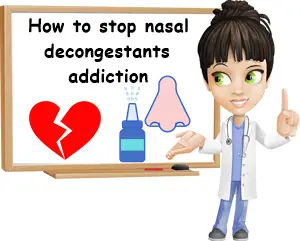Are you reliant on nasal decongestants to breathe normally? If you have been using nasal decongestant sprays for 3 weeks, 3 months or 30 years and you are dependent on them for breathing, then you have, by definition, developed an addiction.
It takes barely a week of continual use of nasal decongestants to become completely reliant on them.
Discontinuing nasal decongestants frequently causes a few days of rebound congestion which is enough to get most people back on them, even though they are not needed anymore.
The reliance on nasal decongestants grows stronger by the day and, before you know it, the addiction sets in.

How do you know you it’s time to stop using nasal decongestants?
Are you over your cold or flu and still using nasal decongestant sprays? Has it been more than 5 days since you started and you still feel you need them? Do you physically feel that you cannot breathe without your nasal decongestant? Do you have one in your pocket, one in your car, one in a drawer at home and one at the office? Do you always carry nasal decongestant spray with you?
Do you start feeling anxious and maybe even panic if you run out of nasal decongestant? Are you irritated, angry, stressed or unproductive if you don’t use your nasal decongestant? If you run out, does it becomes a priority to get one? If you’ve answered ‘yes’ to one of these questions, then it’s time you stopped using nasal decongestants.
Do you need nasal decongestants?
One of the biggest myths we’re told is that we need nasal decongestants to treat congestion in respiratory infections. We don’t. Nose stuffiness is a symptom, not a disease in itself, and while it may be highly unpleasant and distressing, it’s not something that needs to be treated in adults. Not with medicated nasal decongestant sprays.
Even really bad congestion is best approached with natural solutions and home remedies such as saline sprays, nasal irrigation, maintaining adequate levels of humidity in the air and drinking lots of fluids, preferably warm.
A blocked nose may not be a medical emergency, but it can become so distressing that you would do just about anything for some relief. However, the temporary relief you get from the use of a nasal decongestant spray is not worth the damage to your nose mucous membranes and dangers such as developing an addiction to nasal decongestants and side effects such as a dry nose, nosebleeds, insomnia, headaches or loss of smell. Especially considering that you can achieve the same results with natural remedies. The use of nasal decongestants is extremely hard to discontinue and can quickly become a compulsion, an irresistible craving or obsession. So how do you go about it?

How to stop using nasal decongestants
Here are my tried and tested steps to overcoming nasal decongestants addiction:
You have to decide that you want to do this
There are people who have been using nasal decongestants for 10 years, 20 years, 30 years. It’s also true that some people quit nasal decongestants long before a decade has passed. What’s the difference? Isn’t it the same addiction for everyone? To be able to take measures and drive a change in your life, you have to make a choice. You have to decide that you want to get rid of your nasal decongestants addiction. Decide that you will do it. This is the first big step, the foundation, if you will, of your goal.
Gather support
You have to be mentally prepared to quit nasal decongestants. But as prepared as you may think you are, there will likely be moments when you will feel unsure of your decision, doubt your willpower and readiness and consider giving up.
Your support system, your family and friends, your colleagues, even your boss can help you overcome potential moments of weakness.
Your safety net will be the people around you who will be firm about not handing you that nasal decongestant spray, who will keep you distracted so you don’t go buying one, comfort you when you feel like caving in, encourage you by telling you how you’re one step closer to achieving your goal and reassure you that you still want it that much. Inform the people around you of what you are planning so they may be there for you to support and help you.
Take time off
Allow yourself a few days to focus on getting over the need to use nasal decongestants. You can start the process Friday afternoon after work by taking a hot shower or bath, having a warm cup of tea and just relaxing.
Or do this when you have a week off or are on vacation. You likely won’t need more than 3-7 days to overcome the rebound congestion which is really the worst part.
Take it one step at a time
When you go off nasal decongestants after being on them for a while, the rebound congestion will be rough. You will feel like you can’t breathe at all, you might not even be able to sleep, eat or relax.
It’s best if you have the next day or next few days off to tackle your nasal decongestants addiction and nothing else. When the rebound congestion hits you, tell yourself that you have nowhere to go the next day.
Tell yourself that you don’t have anything urgent to do. Tell yourself that it doesn’t matter if you don’t get any sleep at all. You’ll sleep when you will feel better. And just stay in bed or on the couch on your phone, read something, do the dishes, play a board game etc. Tell yourself this is exactly what you need to do right now. Everything else will get taken care of after this is over with.
Have options
Getting off nasal decongestants can be rough the first few days. It can help you mentally to have some benign options for dealing with nose stuffiness. Here are my favorite home remedies and solutions for a stuffy nose:
- Drink lots of fluids: flat water, sparkling water, herbal teas, soup, sports drinks etc. Fluids keep mucous membranes hydrated and moist, helping relieve the discomfort brought on by dryness, and can help with breathing.
- Consider warm fluids which can help with decongestion more.
- Wash your face with lots of (warm) water several times a day. This is a great solution for when you have congestion or a runny nose due to both a respiratory infection and allergies.
- Take a hot shower. If you feel you can’t take it anymore, go take a hot shower or bath. The steam will help open up your nasal passages.
- Use steam. Turn on the hot water in the bathroom to create steam and just sit there breathing in that moisture.
- Breathe steam from a pot. Alternatively, you can boil a big pot of water, position your face above the pot with a clean cloth or kitchen towel over your head, and just breathe in the steam. You can even add a drop of peppermint oil or other essential oils or some tea herbs to the water.
- Irrigate the nasal passages using a neti pot or nasal irrigator to help clean mucus buildup that may be hindering your breathing.
- Use saline solution sprays. Nasal sprays with just saline solution are such a wonderful option to combat congestion and rebound congestion and can help you get over your nasal decongestants addiction.
- Use a humidifier or vaporizer. Make sure there is enough humidity in the air to prevent your nasal passages from drying out. A lot of times people feel compelled to reach for their nasal decongestant when their nose is too dry. Humidity promotes decongestion and can make the transition easier.
Remember that these are home remedies and natural solutions for nasal congestion. While they will help tackle congestion and provide some degree of relief, they might not work as good as medicated nasal decongestant sprays, especially if you’ve been using these for weeks, months or years. Nevertheless, include these remedies in your routine and use them consistently to help you resist the urge to go for the nasal decongestant. Also find out what different nose mucus colors mean for your health.
Conclusion
Nasal decongestants addiction is not easy to overcome. But it can be done, and once you’re over it, you might discover that you don’t actually need nasal decongestants at all. It’s likely you will tolerate congestion better after you stop using medicated nasal decongestant sprays and enjoy overall better quality of life. The cost is a few days of your life dedicated to sitting at home, drinking lots of water, tea or eating soup, taking relaxing hot baths and just resting.
